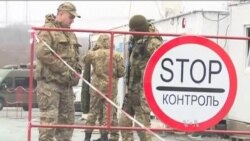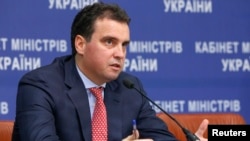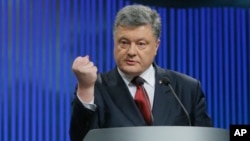Ukraine's political crisis deepened Monday with the resignation of the deputy prosecutor general, who accused his superior of "running a dead institution with no independence."
Vitaliy Kasko’s departure follows a similar move by Economy Minister Aivaras Abromavicius earlier this month, who also accused loyalists of Ukraine's president of widespread corruption.
"It is a crisis of trust. It is a crisis of, basically, values,” Abromavicius said. “I think we really need to use this opportunity to bring in a completely different set of people with a completely different mindset."
That opportunity could come Tuesday when parliament convenes to debate a report on the coalition government's performance, which could force a no confidence vote and lead to a snap election.
A parliamentary source said that, after a meeting of various faction leaders Monday, "the general mood is that the government should leave."
But if the government falls, Ukraine’s progress could be set back even further, according to analyst Orysia Lutsevych of Chatham House.
"I think nobody is seriously interested in the new elections, because we will get pretty much the same parliament,” Lutsevych said. “It will just delay time and drain resources in a time of economic hardship."
Slow reform
Two years after street protests led to the overthrow of president Viktor Yanukovych, Ukraine's slow pace of reform is testing Western allies. Yatseniuk's approval ratings have plummeted to less than 1 percent, the economy has tanked and a conflict with separatist rebels has no end in sight.
The International Monetary Fund has warned that the $40 billion bailout of Ukraine is at risk.
"On the one hand, there is not a critical mass of reformers in key branches of government,” Lutsevych said. “Secondly, it is because we do have these strong vested interests in Ukraine — entrenched through different state enterprises, cash flows through the banks, and fusion of capital and political life. And, finally, it is because the whole bureaucracy and administration has not been changed."
President Petro Poroshenko blames the slow pace of reform on the continuing conflict in the east against pro-Russian separatists. Speaking at the recent Munich Security Conference, he had tough words for Moscow.
"The only thing which needs to be done is remove your troops from Ukrainian territory, both on Donbas and Crimea; return the Ukrainian control on the control part of Ukrainian and Russian border; release all the hostages,” Poroshenko said, then “we will have no tension, no escalation, no war in this region.”
Russia claims it is abiding by the year-old Minsk Agreement, which mandates demilitarization in return for Kyiv giving more autonomy to rebel-held regions.
But monitors from the Organization for Security and Cooperation in Europe warn the conflict is at its worst point in six months, and elections due to be held in the east under the Minsk agreement look likely to be delayed for several months.
Some information for this report was provided by Reuters.







